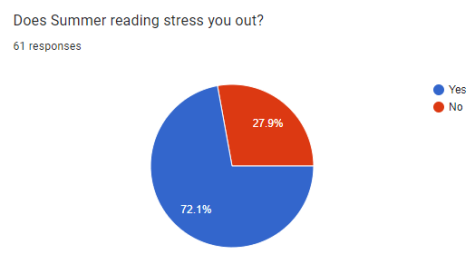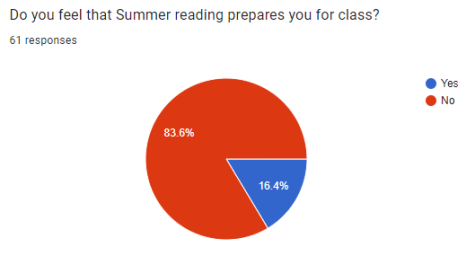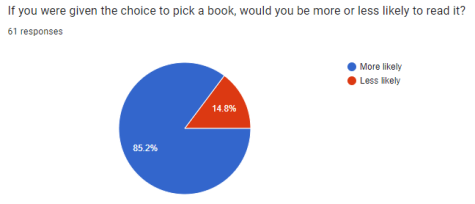Gimme a Break!
Summer Reading Pros and Cons
April 3, 2023
Summer reading: To read or not to read, that is the question. As we approach the end of the school year, students are eager to enjoy their well-deserved summer break but are hit with the harsh reality: summer assignments. Most students procrastinate on their summer homework, which is one of the main reasons they don’t like it: it makes them stressed because they leave it to the last minute. Teachers’ and students’ opinions vary greatly on this topic.
I personally find myself stressed out with summer assignments, and thinking I was alone, I decided to conduct research among my classmates and surprisingly, found out that 44 out of 61 students also feel stressed out because of summer reading. Technically, summer is supposed to be our time to relax, but summer reading assignments might interfere with our leisure time.

To make matters worst for students, some teachers won’t discuss either the assigned book or the homework in class when we come back; so really, students question it: what is the real point? I am not the only one who thinks that; 51 out of 61 students feel that summer assignments don’t prepare them for class.

My English teacher’s opinion is quite different from the students. AP English Literature and AICE Language teacher Mrs. Steinberg was able to offer me a different point of view. When I asked her “how does summer reading help your class?”, she told me that, “the summer reading assignment gives me a preview of their [10th graders] reading comprehension and writing skills” and “provides [AP Lit students] with a taste of literary analysis, warming their minds to consider an author’s choices about characterization, setting, narration, structure, and figurative language.” I personally found this takeaway interesting, and it made me understand that summer reading might actually be a positive thing if done on time and with organization.
Another complaint that students have is that summer reading books are usually long and dare I say, not interesting, which makes students unwilling to read them. I questioned my classmates, “If it was optional, would you read the suggested book? Explain” and here are some answers I got:
“No. I wouldn’t read the book. Instead, I’d read a book that I would actually like to read which could help my reading comprehension and help me more in general.”
“No, because I find it as if summertime is a time for relaxation, and having something that’s mandatory to do demeans that great factor of summer”
However, some people also said:
“To me, if the book was interesting, yes I would read it. I like a certain genre so some books that are suggested to me are not interesting.”
“Depends on if it’s something I’m interested in, the book I read last Summer was actually really good and I didn’t mind reading it but some are way too complicated.”
With that in mind, I asked students if they would prefer to pick their own book and look at the answers I got:

I wondered and wondered… what goes into a teacher’s mind while selecting our summer assignment? What is the process like? So I asked. Mrs. Steinberg informed me that she “attempt[s] to select texts that aren’t too long, have an engaging protagonist who wrestles with a relevant conflict, and provide the reader with some insight into what it means to be human.” She also added that for the following year, she is considering “offering students a list of novel choices” (yay!).
What I learned from my survey and my brief interview with my English teacher is that students in higher-level courses are willing to work and eager to learn, but sometimes the books might be understimulating and unengaging, which causes procrastination and unnecessary stress. If someone asked for my humble opinion on something that would satisfy both sides, I would suggest teachers allow students to choose a book of their liking from a list and I would encourage teachers to discuss the books during class. But hey, that is just my opinion!













































